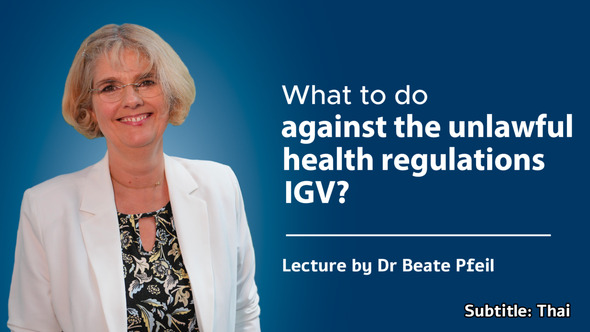All Videos (ภาษาไทย)
What can we do about the health regulations IHR, which violate international law? (Lecture by Dr. Beate Pfeil)
04.07.2024
Subtitle "Afrikaans" was produced by machine.Subtitle "አማርኛ" was produced by machine.Subtitle "العربية " was produced by machine.Subtitle "Ārāmāyâ" was produced by machine.Subtitle "azərbaycan dili " was produced by machine.Subtitle "беларуская мова " was produced by machine.Подзаглавието "България" е създадено от машина.সাবটাইটেল "বাংলা " মেশিন দ্বারা তৈরি করা হয়েছিল।Subtitle "བོད་ཡིག" was produced by machine.Subtitle "босански" was produced by machine.Subtitle "català" was produced by machine.Subtitle "Cebuano" was produced by machine.Subtitle "ગુજરાતી" was produced by machine.Subtitle "corsu" was produced by machine.Podtitul "Čeština" byl vytvořen automaticky.Subtitle "Cymraeg" was produced by machine.Subtitle "Dansk" was produced by machine.Untertitel "Deutsch" wurde maschinell erzeugt.Subtitle "Untertitel" was produced by machine.Ο υπότιτλος "Ελληνικά" δημιουργήθηκε αυτόματα.Subtitle "English" was produced by machine.Subtitle "Esperanto" was produced by machine.El subtítulo "Español" se generó automáticamente.Subtitle "Eesti" was produced by machine.Subtitle "euskara" was produced by machine.Subtitle "فارسی" was produced by machine.Subtitle "Suomi" was produced by machine.Le sous-titrage "Français" a été généré automatiquement.Subtitle "Frysk" was produced by machine.Subtitle "Gaeilge" was produced by machine.Subtitle "Gàidhlig" was produced by machine.Subtitle "Galego" was produced by machine.Subtitle "Schwizerdütsch" was produced by machine.Subtitle "هَوُسَ" was produced by machine.Subtitle "Ōlelo Hawaiʻi" was produced by machine.Subtitle "עברית" was produced by machine.Subtitle "हिन्दी" was produced by machine.Subtitle "Mẹo" was produced by machine.Subtitle "Hrvatski" was produced by machine.Subtitle "Kreyòl ayisyen " was produced by machine.Subtitle "Magyar" was produced by machine.Subtitle "Հայերեն" was produced by machine.Subtitle "Bahasa Indonesia " was produced by machine.Subtitle "Asụsụ Igbo " was produced by machine.Textun"Íslenska" var framkvæmt vélrænt.Sottotitoli "Italiano" sono stati generati automaticamente.字幕は"日本語" 自動的に生成されました。Subtitle "Basa Jawa" was produced by machine.Subtitle "ქართული" was produced by machine.Subtitle "қазақ тілі " was produced by machine.Subtitle "ភាសាខ្មែរ" was produced by machine.Subtitle "ಕನ್ನಡ" was produced by machine.Subtitle "한국어" was produced by machine.Subtitle "कोंकणी語" was produced by machine.Subtitle "کوردی" was produced by machine.Subtitle "Кыргызча" was produced by machine.Subtitle " lingua latina" was produced by machine.Subtitle "Lëtzebuergesch" was produced by machine.Subtitle "Lingala" was produced by machine.Subtitle "ພາສາ" was produced by machine.Subtitle "Lietuvių" was produced by machine.Subtitle "Latviešu" was produced by machine.Subtitle "fiteny malagasy" was produced by machine.Subtitle "te reo Māori" was produced by machine.Subtitle "македонски јазик" was produced by machine.Subtitle "malayāḷaṁ" was produced by machine.Subtitle "Монгол хэл" was produced by machine.Subtitle "मराठी" was produced by machine.Subtitle "Bahasa Malaysia" was produced by machine.Subtitle "Malti" was produced by machine.Subtitle "မြန်မာစာ " was produced by machine.Subtitle "नेपाली" was produced by machine.Ondertitels "Nederlands" machinaal geproduceerd.Subtitle "Norsk" was produced by machine.Subtitle "chiCheŵa" was produced by machine.Subtitle "ਪੰਜਾਬੀ" was produced by machine.Podtytuł "Polska" został utworzony przez maszynę.Subtitle "پښتو" was produced by machine.Legenda "Português" foi gerada automaticamente.Subtitle "Română" was produced by machine.Subtitle "Язык жестов (Русский)" was produced by machine.Субтитры "Pусский" были созданы машиной.Subtitle "Kinyarwanda" was produced by machine.Subtitle "सिन्धी" was produced by machine.Subtitle "Deutschschweizer Gebärdensprache" was produced by machine.Subtitle "සිංහල" was produced by machine.Subtitle "Slovensky" was produced by machine.Subtitle "Slovenski" was produced by machine.Subtitle "gagana fa'a Samoa" was produced by machine.Subtitle "chiShona" was produced by machine.Subtitle "Soomaaliga" was produced by machine.Subtitle "Shqip" was produced by machine.Subtitle "србски" was produced by machine.Subtitle "Sesotho" was produced by machine.Subtitle "Basa Sunda" was produced by machine.Undertext "Svenska" är maskinell skapad.Subtitle "Kiswahili" was produced by machine.Subtitle "தமிழ்" was produced by machine.Subtitle "తెలుగు" was produced by machine.Subtitle "Тоҷикй" was produced by machine.Subtitle "ภาษาไทย" was produced by machine.ንኡስ ኣርእስቲ "ትግርኛ" ብማሽን እዩ ተፈሪዩ።Subtitle "Türkmençe" was produced by machine.Subtitle "Tagalog" ay nabuo sa pamamagitan ng makina.Subtitle "Türkçe" was produced by machine.Subtitle "татар теле" was produced by machine.Subtitle "Українська " was produced by machine.ذیلی عنوان "اردو" مشین کے ذریعہ تیار کیا گیا تھا۔Subtitle "Oʻzbek" was produced by machine.Subtitle "Tiếng Việt" was produced by machine.Subtitle "Serbšćina" was produced by machine.Subtitle "isiXhosa" was produced by machine.Subtitle "ייִדיש" was produced by machine.Subtitle "Yorùbá" was produced by machine.Subtitle "中文" was produced by machine.Subtitle "isiZulu" was produced by machine.
kla.TV accepts no liability for defective translation.kla.TV accepts no liability for defective translation.kla.TV accepts no liability for defective translation.kla.TV accepts no liability for defective translation.kla.TV accepts no liability for defective translation.kla.TV accepts no liability for defective translation.kla.TV не носи отговорност за некачествен превод.অপর্যাপ্ত অনুবাদের জন্য kla.TV কোন দায় বহন করে না।kla.TV accepts no liability for defective translation.kla.TV accepts no liability for defective translation.kla.TV accepts no liability for defective translation.kla.TV accepts no liability for defective translation.kla.TV accepts no liability for defective translation.kla.TV accepts no liability for defective translation.kla.TV nenese žádnou odpovědnost za chybné překlady.kla.TV accepts no liability for defective translation.kla.TV accepts no liability for defective translation.kla.TV übernimmt keine Haftung für mangelhafte Übersetzung.kla.TV accepts no liability for inadequate translationΗ kla.TV δεν φέρει καμία ευθύνη για ανεπαρκή μετάφραση.kla.TV accepts no liability for defective translation.kla.TV accepts no liability for defective translation.kla.TV no se hace responsable de traducciones incorrectas.kla.TV accepts no liability for defective translation.kla.TV accepts no liability for defective translation.kla.TV accepts no liability for defective translation.kla.TV accepts no liability for defective translation.kla.TV n'assume aucune responsabilité en cas de mauvaise traduction.kla.TV accepts no liability for defective translation.kla.TV accepts no liability for defective translation.kla.TV accepts no liability for defective translation.kla.TV accepts no liability for defective translation.kla.TV accepts no liability for defective translation.kla.TV accepts no liability for defective translation.kla.TV accepts no liability for defective translation.kla.TV accepts no liability for defective translation.kla.TV accepts no liability for defective translation.kla.TV accepts no liability for defective translation.kla.TV accepts no liability for defective translation.kla.TV accepts no liability for defective translation.kla.TV nem vállal felelősséget a hibás fordításértkla.TV accepts no liability for defective translation.kla.TV accepts no liability for defective translation.kla.TV accepts no liability for defective translation.kla.TV tekur enga ábyrgð á áræðanleika þýðingarinnarKla.TV non si assume alcuna responsabilità per traduzioni lacunose e/o errate.Kla.TV は、不適切な翻訳に対して一切の責任を負いません。kla.TV accepts no liability for defective translation.kla.TV accepts no liability for defective translation.kla.TV accepts no liability for defective translation.kla.TV accepts no liability for defective translation.kla.TV accepts no liability for defective translation.kla.TV accepts no liability for defective translation.kla.TV accepts no liability for defective translation.kla.TV accepts no liability for defective translation.kla.TV accepts no liability for defective translation.kla.TV accepts no liability for defective translation.kla.TV accepts no liability for defective translation.kla.TV accepts no liability for defective translation.kla.TV accepts no liability for defective translation.kla.TV accepts no liability for defective translation.kla.TV accepts no liability for defective translation.kla.TV accepts no liability for defective translation.kla.TV accepts no liability for defective translation.kla.TV accepts no liability for defective translation.kla.TV accepts no liability for defective translation.kla.TV accepts no liability for defective translation.kla.TV accepts no liability for defective translation.kla.TV accepts no liability for defective translation.kla.TV accepts no liability for defective translation.kla.TV accepts no liability for defective translation.kla.TV accepts no liability for defective translation.kla.TV aanvaardt geen aansprakelijkheid voor foutieve vertalingen.kla.TV accepts no liability for defective translation.kla.TV accepts no liability for defective translation.kla.TV accepts no liability for defective translation.kla.TV nie ponosi odpowiedzialności za wadliwe tłumaczenie.kla.TV accepts no liability for defective translation.kla.TV não se responsabiliza por traduções defeituosas.kla.TV accepts no liability for defective translation.kla.TV accepts no liability for defective translation.kla.TV не несет ответственности за некачественный перевод.kla.TV accepts no liability for defective translation.kla.TV accepts no liability for defective translation.kla.TV accepts no liability for defective translation.kla.TV accepts no liability for defective translation.kla.TV accepts no liability for defective translation.kla.TV accepts no liability for defective translation.kla.TV accepts no liability for defective translation.kla.TV accepts no liability for defective translation.kla.TV accepts no liability for defective translation.kla.TV nuk mban asnjë përgjegjësi për përkthime joadekuate.kla.TV accepts no liability for defective translation.kla.TV accepts no liability for defective translation.kla.TV accepts no liability for defective translation.Kla.TV tar inget ansvar för felaktiga översättningar.kla.TV accepts no liability for defective translation.kla.TV accepts no liability for defective translation.kla.TV accepts no liability for defective translation.kla.TV accepts no liability for defective translation.kla.TV accepts no liability for defective translation.kla.TV ንዝኾነ ጉድለት ትርጉም ዝኾነ ይኹን ሓላፍነት ኣይቅበልን እዩ።kla.TV accepts no liability for defective translation.kla. Walang pananagutan ang TV sa mga depektibong pagsasalin.kla.TV accepts no liability for defective translation.kla.TV accepts no liability for defective translation.kla.TV accepts no liability for defective translation.kla.TV عیب دار ترجمہ کے لیے کوئی ذمہ داری قبول نہیں کرتا ہے۔kla.TV accepts no liability for defective translation.kla.TV accepts no liability for defective translation.kla.TV accepts no liability for defective translation.kla.TV accepts no liability for defective translation.kla.TV accepts no liability for defective translation.kla.TV accepts no liability for defective translation.kla.TV accepts no liability for defective translation.kla.TV accepts no liability for defective translation.
This is a modal window.
The media could not be loaded, either because the server or network failed or because the format is not supported.
What can we do about the health regulations IHR, which violate international law? (Lecture by Dr. Beate Pfeil)
Dr. Beate Pfeil answers critical questions about the illegal adoption of the International Health Regulations (IHR) of the WHO, its consequences and possible courses of action
[weiterlesen]
What can we do about the health regulations IHR, which violate international law? (Lecture by Dr. Beate Pfeil)
Sendung und Zubehör in der gewünschten Qualität herunterladen:
Nutzungsrecht:
Standard-Kla.TV-Lizenz





04.07.2024 | www.kla.tv/29621
For today, June 17, 2024, the organization United for Freedom has invited people to a press conference here in the beautiful Taunus. There are a multitude of topics that are to be discussed today. Among other things, Dr. Pfeil will speak about the International Health Regulations, which were passed in violation of international law. As is well known, these were passed at the WHO General Assembly in Geneva a good 14 days ago. Dr. Pfeil: Yes, about the adoption of the IHR in violation of international law. Well, that was quite a thriller at the World Health Assembly, the way in which these IHR were supposedly passed. And of course it is important that I would also like to briefly outline the most explosive content of these international health regulations and what we can do. On the subject of the WHO, very briefly: You often hear that it is a private organization. Formally, the WHO is a government organization. That means that it is the classic association of states for a specific purpose. Here they officially claim to want to promote health, public health. Such organizations then usually set up their own bodies. In this case it is the World Health Assembly. Representatives of the member states are seconded there. Then we have an Executive Council as the executive body and then the very important and very all-powerful Director General, who sits at the head of the so-called Secretariat. The original plan was to adopt two international treaties. One was the IHR, which already exists in a constitution from 2005, but which has now been extensively revised. And then the adoption of a new international treaty, the so-called Pandemic Treaty, was actually also planned. The adoption of the Pandemic Treaty has been postponed, there is a lot of pressure on it, and it should be adopted at next year's World Health Assembly at the latest if possible - that is what Mr Tedros wants. The people who may be behind him, they hope that it will be adopted this year. Exactly, on the timeline. It was claimed that the IHR had been adopted. If we simply assume that, then they will automatically come into force after twelve months. Unless the respective states expressly declare the so-called "opt-out". In other words, they object to this coming into force within ten months. That would be by March 31st. The adoption of the international "health regulations" - I put it in quotation marks - took place in a very strange way. Firstly, we have the mandatory procedural provision of Article 55 IHR. According to this, the final version, which will then be put to the vote, must actually be available to the states at least four months before the vote in the World Health Assembly. The purpose is of course that the states must be clear about the political, economic, administrative and also financial consequences. They must also check whether these IHR changes are compatible, for example with their national constitutions or with international law. Instead, it was rushed and really close to completion. We were in Geneva and held a press conference there as lawyers in the morning. At the parallel event, we did not yet know that this madness would happen that evening, that it had supposedly been passed. How did it actually go? There is a video recording of this vote - still visible on the website. Of course, as far as I can see, you cannot see the whole hall, but really only the plenary session at the front. Then the president says: Has everyone seen this final version? I see no objections. And then he asks, yes, does everyone agree? And then comes again: I see no objection. I see no contradiction. So it is a very strange procedure, especially since according to procedural rule 72 there is a requirement that the vote must be by a show of hands or, if requested, even by roll call. That was a complete silence. So a very, very dubious story. Then it was claimed that there was unanimity, which no one who sees this video can verify. It was reported positively that 37 states had expressly spoken out in favor of the adoption of the IHR. There is a list, and of course Germany and several European states are among them, as well as others such as the USA. But there was also a lot of opposition in the discussion. Belarus, Iran, Argentina, Costa Rica and other states - Slovakia is very important, just think of this assassination attempt. Opposition was also allowed. That is why this strange story. WuWas the quorum even reached? 99 states would have had to explicitly agree by a show of hands. Very questionable. Therefore definitely because of Article 55, paragraph 2 alone. Marianne Grimmenstein put it so beautifully: The WHO is violating its own rules. Voting is illegal under international law and therefore invalid. And any state that does not object to this is actually putting itself in the wrong. On to the essential content. In addition to the health emergency of international importance - aptly abbreviated in English to fake, how wrong - there is now also this superlative form, the pandemic emergency. It is also strange that it is supposed to be about a high risk, i.e. only the risk of exceeding the capacity of health systems or causing social and economic disruption, through an allegedly very dangerous infectious disease that is contagious across borders. From a legal perspective, you have to ask yourself: Are such criteria suitable for a pandemic emergency of this kind, which is then supposed to justify massive infringements of fundamental rights? Because that is not due to the disease itself, but rather to the state framework. So that is actually a bad reason for infringements of fundamental rights that a Director-General Tedros can then recommend on the basis of this pandemic emergency. And there is a fear that even stricter interventions are supposed to be justified with the pandemic emergency. Then very problematic, so-called relevant health products and a very important new principle at the WHO is the so-called equity, the distributive justice. This means the fact that the poorer countries, the developing countries in bold quotation marks, are now also enjoying all these blessings of so-called vaccines, of course modRNA technology and medicines from those - I am deliberately saying this very ironically - those pharmaceutical companies that indirectly or directly co-sponsor the WHO. And at this point at the latest, one asks oneself: Who actually controls the WHO? Is it actually still the states or is it the sponsors? As is well known, the WHO is almost 85 percent dependent on voluntary donations, including many private ones from directly or indirectly the pharmaceutical industry. The Bill Gates Foundation alone probably directly or indirectly contributes 20 percent of the WHO's total budget. But now the fight against so-called misinformation and disinformation is expressly anchored in the IHR. In this context, around 40 partnership agreements were concluded with big tech companies from the digital industry, Google, Facebook and Co., and of course Microsoft in the background, the contents of which are also not disclosed. Against this background, we naturally have to fear an intensification of the censorship problem, especially in the free media, but above all in a large part of the serious scientific community, which has already been excluded from the discourse in the past. And without free discourse, we definitely cannot get anywhere near the truth that is urgently needed here. All of this against the background of the still great lack of an independent, legally binding control body that, for example, will slap Mr. Tedros on the wrist when he declares a fake or a pandemic emergency. In theory, he must make a risk-benefit assessment beforehand for every single measure he recommends. The states, which are organized on a liberal basis, must do this too. But since no one controls him, since there are no checks and balances, he can simply arbitrarily prescribe both the fake and the pandemic emergency as well as these recommendations. Like an octopus, the WHO continues to attack state administrations. There is now to be a national IHR authority and the so-called core capacities at the various administrative levels are to be strengthened, including of course the fight against so-called infodemics - in other words in the area of combating alleged misinformation, where the WHO and the member states then reserve the corresponding monopoly on the truth. There is a lack of an independent control body. The recommendations can involve massive infringements of fundamental rights, which, if not tested for risk-benefit, lead to massive violations of fundamental rights worldwide. The promotion of research into vaccines and medicines is inevitably technically linked to so-called gain-of-function research. This in turn is linked to biological weapons research and is associated with blatant security risks. This means that there is an even greater danger that ultimately, within these WHO regulations, Gdangers are generated that the WHO claims to want to prevent. In fact, a state like Germany, for example, has an obligation under international law at WHO level when the IHR comes into force. But in theory Germany can say: Stop, I will not implement what Mr Tedros recommends, for example, at home because it violates the Basic Law. That is theoretically conceivable and they should actually do so. In practice we have seen that states shift responsibility to the WHO. Germany is one of the main state sponsors of the WHO anyway. Germany will willingly enforce it. At least in the past, Germany has no longer cared about the requirements of the Basic Law. Against this background, this means that we have the danger of establishing a foreign-controlled and totalitarian global health regime and, of course, ultimately the danger of long-term and massive human rights violations. Human dignity is inviolable. A state that intervenes in physical integrity, in elementary civil liberties, must always justify this intervention. It must always weigh up the risks and benefits. In 2020, we did not hear this justification in Germany and in many countries around the world. We did not hear any evidence. The state has a duty to deliver here, it has not fulfilled it! By not providing this justification alone, it is already committing human rights violations on a massive scale. What can be done about it? Of course, we must shake up the public as much as possible, which is why important media are represented here too. Demonstrations, leaflets and so on. But the first and foremost thing now is to shake up those in positions of responsibility, those who are still of good will. It is very important that legal steps are taken, expedited proceedings, constitutional complaints, extremely important. Every single person can, for example, talk to their Bundestag representative in their constituency. And these people try to draw attention to the issue. There are many ways to take action here. Even just talking to friends, acquaintances, neighbors, where the door is ajar. We really must and we can pull out all the stops here. There is no measure that is not important. But I would say that the focus really needs to be on persuasion, education, education, education among those in political positions of responsibility. Personally, I see little chance of this happening with the federal government. That is why we are using this petition to try and persuade the Bundestag to ask the federal government to opt out. And of course, if things were done properly, a constitutional complaint against this completely unlawful IGV should actually be successful if we still had normal conditions. And we hope and we rely on that we will get back to normal conditions. And we will all try to do our part to make that happen. Thank you very much.
from hm